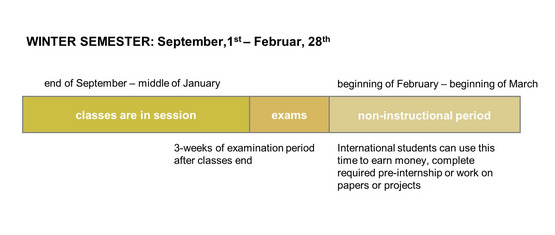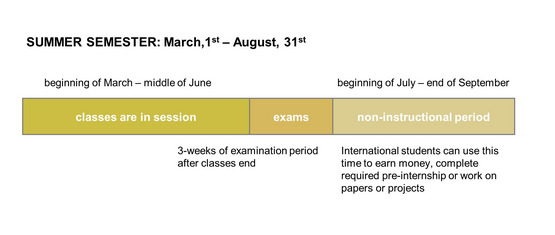Studying at Osnabrück University of Applied Sciences
The Center for International Students is your point of contact before and during your entire studies. To get you started, we have compiled some information below.
Osnabrück University of Applied Sciences offers more than 100 study programs. Have a look at our bachelor programs as well as our master programs.
The following study programs are taught in English:
- International Management B.A.
- International Event Management Shanghai B.A.
(we offer this study program in Shanghai, China, in cooperation with our partner university Shanghai University of International Business and Economics) - International Business and Management M.A.
The academic year at Osnabrück University of Applied Sciences is divided in winter semester and summer semester. You will find more details on the current academic calendar here.
Study programs of Osnabrück University of Applied Sciences regularly can be found on top of the most important German ranking, the CHE-Ranking. In this ranking, study programs are assessed according to criteria such as curriculum, internationality, and students' job prospects. Our library is one of the best academic libraries in Germany and number one in our state of Lower Saxony. Especially its service and its client orientation were given outstanding grades.
Osnabrück University of Applied Sciences achieves excellent results in the international higher education ranking U-Multirank. For example in the category „Industry co-patents“ Osnabrücj University of Applied Sciences comes into 8th place out of 351 universities from all over Europe.
There are several options available to finance your studies. There are various financial sources of funding from self financing, government funding or scholarships from various organizations. Since the scholarship landscape in Germany is diversified, we have compiled an overview of scholarships.
For international degree-seeking students, the Center for International Students offers an information event on jobs and scholarships once per semester.
In order to obtain the necessary documents to study in Germany, some requirements need to be met. The following information is very important, so please read carefully!
Visa - to be applied for at a German Embassy
Depending on your citizenship, you will need a Visa to enter into Germany. Students from EU-countries do not need a visa. All non-EU-citizens can check with the German Foreign Office whether they need a visa or not.
Students from China and Vietnam need to have their visa applications approved by the Akademischen Prüfstelle (APS).
Find out more:
Please note that there are different types of visa. In order to study in Germany for the degree, you will need a visa for a longer stay!
Financial Statement
To obtain a visa and a residence permit in Germany, you will need a financial statement that shows that you have sufficient funds per month. Starting from January 2023, this amount will rise to 934 euros. Some German embassies ask for a blocked account and that you pay a certain amount into it. While in Germany, you can then take out a monthly sum from this account. That way, at least the first year of your studies should be financially sound.
Proof of Health Insurance
In addition, to obtain a visa, you will need proof of health insurance in Germany.
Residence Permit - To be Applied for in Osnabrück
All students from non-EU-countries must apply for a residence permit with the Ausländerbehörde der Stadt Osnabrück (Aliens' Registration Office, link in German) after their arrival.
Registration with the City of Osnabrück
All German and international students who move to Osnabrück have to register within one week of their arrival. Students from EU-countries register with the Bürgeramt, non-EU-citizens register with the Aliens' Registration Office when applying for the residence permit. At the beginning of each semester, Osnabrück University of Applied Sciences offers a collective appointment with the Aliens' Registration Office for all non-EU-students. Participating in this appointment will help you speed up the process of registering and obtaining your residence permit.
And don' t forget: When leaving Osnabrück after finishing your studies, you will need to un-register, also!
Summarized information about the right of residence for international (degree-seeking) students can be dowloaded as PDFs:
- Entering Germany with a visa
- Entering Germany without a visa
- Moving to Osnabrück from within Germany
- General legal information for immigration enrolled in or finishing a course of study (leave of absence, semester abroad, changing your course of studies, work permit, work permit for purposes of job search after graduation)
If you have any questions regarding your residence permit, please contact the Center for Interational Students international@hs-osnabrueck.de.
Sufficient health insurance coverage is a prerequisite for enrollment at a German University. Also when applying for a visa and when registering at the local Foreigner's Registration Office, proof of health insurance must be submitted.
Here you find further information on how to present sufficient health insurance coverage.
In Germany, public universities are mainly financed by the taxpayers' money. Therefore, usually, the individual student does not need to pay any tuition fees.
Students are obligted, though, to pay a semester fee. It contains several components (administrative fee, student services fee, student self-administration fee) among them the semester ticket. This public transportation ticket enables you to use all buses in Osnabrück and regional trains throughout Lower Saxony at no additional fee.
Students holding scholarships from German public institutions (DAAD, GIZ, etc.) do not need to pay the administrative fee, Their semester fee is therefore reduced.
The CampusCard is your student identity card at Osnabrück University of Applied Sciences. It has multiple functions (library card, semesterticket for public transportation, payment card for canteen and cafeterias, print and copy card) and is valid for one semester at a time. The CampusCard is profitable for you in many other ways as you get discounts at the movies, the theater, museums, etc.. Please make sure you always carry the CampusCard with you whether on or off campus. It is no-transferable and only valid for yourself.
In case of loss of your CampusCard, please contact the ServiceDesk (website in German).
International students who need support have several options to choose from. Feel free to ask for help if you need it.
Center for International Students
The Center for International Students supports international students and prospective international students with all their questions around studying at Osnabrück University of Applied Sciences, especially about the following topics:
- application process
- ways to finance one's studies
- German language acquisition
- visa and residence permit
Further information on relevant topics can be found here.
Being a university student has its chances and challenges. Studying in a foreign culture is demanding and requires adapting to new learning and teaching styles. Consult with our Learning Center if you feel that you are not learning effectively.
For all questions regarding your study organization, you can find helpful information here.
Osnabrück University of Applied Sciences offers a lot of support to students - we want you to study successfully with us!
Grades in Germany range from 1.0 to 5.0. 1.0 is the best grade you can get. The grading scheme at Osnabrück University of Applied Sciences comprises 5 grade levels:
- Very Good
≤ 1.50
- Good
> 1.50 and ≤ 2.50
- Satisfactory
> 2.50 and ≤ 3.50
- Sufficient
> 3.50 and ≤ 4.00
- Not Sufficient
> 4.00
In order to pass a class, you have to achieve a 4.0 or higher. In oral exams, the grading may vary from this standard.
The lecturers at Osnabrück University of Applied Sciences use a variety of methods to assess the students' performances and achievements. The method chosen depends on the respective subject and study level. The different assessment categories can be divided up into three categories:
- written (e.g. a written exam of one or several hours at the end of the semester, a term paper)
- oral (e.g. a presentation)
- practical (e.g. a lab exercise with a written report)
Which assessment methods are used, must be specified in the module description.
Many students would like to participate in shaping student life and university politics. If you would like to dedicate part of your spare time to our university, please have a look at the following student and university bodies:
Allgemeiner Studierendenausschuss (AStA)
AStA represents student interests at the university level. This body is elected by the Student Parliament and consists of one or more chairs and several advisors for different fields of interest (e.g. International Affairs, Counseling and University Politics, Event Management, Transportation, Campus Store, etc.).
Student Council
Each faculty has its own Student Council and every student can participate in the elections. The Student Council represents student interests at the faculty level and with the Dean's Office.
Student Councils are active in these other fields:
- regular meetings and exchanges with other student bodies, e.g. the Student Parliament
- supporting (social) university projects
- organisation of student parties throughout the semester
All Student Councils welcome new members!
Faculty Council
The Faculty Council consists ot teachers, administrative staff and students of the respective faculty. Members are elected bi-annually and meet once per month during the semester. The Faculty Council is responsible for all matters concerning the respective faculty and decides especially on the faculty's strategic planning, development and mission.
Study Commission
Each faculty has a Study Commission that consists of students and teaching/administrative staff in equal parts. Members are elected bi-annually and meet once per month during the semester. The Study Commission works on recommendations regarding the development of study and teaching and must be heard in all academic matters (teaching, studies, exams, etc.) before these issues are brought before the Faculty Council.
ECTS (European Credit Transfer System) is an important element of the Bologna process and facilitates credit recognition between universities in Europe.
Depending on the degree program, the number of credit points can vary:
| Credit Points | |
| Bachelor | 180 – 240 |
| Master | 60 – 120 |
ECTS-credit points measure the student workload and comprise both time spent in class and time spent studying outside the classroom including exams, papers, internships, etc.
To achieve 1 ECTS-point, students are supposed to study for 30 hours.
As a rule, 30 ECTS-credit points are acquired per semester. At Osnabrück University of Applied Sciences, most modules have a workload of 5 ECTS which equals 180 hours of study.
To achieve a bachelor's degree, students need to successfully complete between 180 ECTS (6 semesters) or 240 ECTS (8 semesters).
In a consecutive master study program, students must complete between 60 ECTS (2 semesters) and 120 ECTS (4 Semesters). To be awarded a master's degree, students must complete 300 ECTS credit points in total.
Counseling and Support
- Tatjana Maier
E-mail: t.maier@hs-osnabrueck.de
Phone: +49 (0)541 969-3045
Room: AB 0011
Office hours:
Tuesday from 14:00 to 16:00, Wednesday from 09:00 to 12:00, Thursday from 14:00 to 17:00

